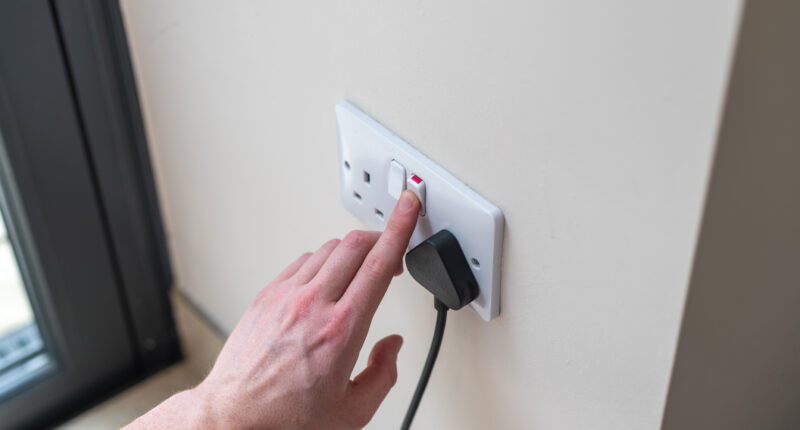THE Easter holidays are the perfect opportunity to make sure certain energy-draining appliances are turned off.
Switching off appliances at home is one of the easiest ways to cut energy costs.
And the four-day weekend typically marks a turning point in the weather as temperatures start to rise and the evenings get lighter.
It means everyday items plugged into the walls or on standby can easily be turned off as they won’t be needed in the coming warmer months.
This little action has the potential to save hundreds of pounds on your energy bill.
Ahead of the Easter weekend, we reveal the top seven appliances you should switch off to save money.


Heating
As the average temperature becomes higher and there are more hours of daylight, heating devices can easily be switched off to save costs.
Experts said March 26 is the official day households should aim to turn off the heating.
Jordan Chance, a heating expert from PlumbNation, told The Sun previously: “Having the heating on only as and when you need it, is the best way to save energy.
“As the weather gradually begins to turn warmer, more and more people are keeping their heating on for shorter amounts of time.”
Most read in Money
Ahead of Easter, consider retiring your radiator and turning off the thermostat if you haven’t done so already.
If you don’t want to turn off your heating completely, changing the setting on your thermostat can also help you slash your energy bill.
Experts have previously told The Sun the exact temperature to set it at so that you can save cash and stay warm.
Tumble dryer
You might have been putting your tumble dryer to good use during winter when it’s hard to air dry your clothes.
But Easter is a good opportunity to start drying clothes outside as the warm weather approaches.
If you’re a bigger family doing three loads of washing a week and piling it into the dryer, you’ll be spending £154 a year.
By ditching your tumble dryer during the warmer months, you could be saving around £52.
Uswitch energy expert Justina Miltienyte said: “Putting it on the washing line is free.
“Your clothes will take longer to dry on the line if they are dripping wet, so use your washing machine’s spin cycle to squeeze out the excess water.”
Another way to reduce your tumble dryer use is by doing an extra 10-minute spin in the washing machine first to get it drier beforehand.
We also reveal the cheapest time to wash and dry clothes to save money on energy bills – if you’re on the right tariff.
Electric towel rail
An electric towel rail can warm up your towels or help dry your clothes, but the start of spring is a good point to cut down usage.
Smart meter data analyst Loop says these appliances cost £176 to run annually so turning them off can be a good way of saving energy.
Microwave
Switching off your microwave after every use is another way you could save cash and now is a good time to make the change – especially if you are going away for the Easter weekend.
This is because they are what’s known as “vampire” appliances – draining energy unnecessarily, even when not in use.
Energy Saving Trust adds that a microwave is one of the appliances that will “eat up electricity” when left on standby.
Unplug it from the walls and you could save money on your energy bill.
If you’ve got any garden parties planned for the Easter weekend, you might be considering plugging in a second fridge.
But putting your drinks in a bucket of ice could be more cost-effective.
An extra fridge, particularly one that goes unused most of the time, could be adding £99 a year to your energy bill, according to Loop.
Outdoor lighting
As the evenings get lighter, you can easily cut down on any lamps or lighting you use around the home and garden.
Outdoor lights can be useful if you are arriving home in the dark or sitting in the garden until late, and they can make your property look pretty too.
But they’re not without cost. Loops says that having two 60-watt outside lights on for 10 hours a night could add £125 a year to your energy bills.
That doesn’t mean you do should do away with security lights, of course.
But you could consider having them on a timer so they’re not sitting on standby and using energy during daylight hours.
Or the extra sunshine is a good opportunity to switch to solar lighting, which won’t sap your energy usage.
TV
TV is one of the most energy-hungry devices in the house when left on standby.
You may be going away for Easter weekend or not watching as TV as usual over the holidays, so make sure you switch off entirely when the gadget is not in use.
A telly uses 40 watts of energy when it’s being used, but still wants 10 watts when it’s sitting on standby.
That means it costs you 3.7p if you’re watching your TV for five hours, but it’ll still cost you 4.45p a day if it’s unused by sitting in standby mode, adding up to £16.24 over a year.
For more ways to cut costs, a money-saving expert has explained the five things in your kitchen that are pushing up energy bills and how to save costs.


And here are four energy tweaks you can make in warmer weather to slash £1,740 off your bill.
Plus, we explain how to get help with bills if you are struggling.









